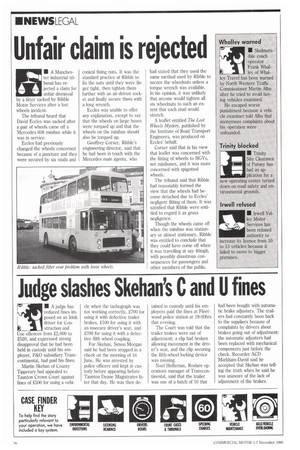Unfair claim is rejected
Page 22

If you've noticed an error in this article please click here to report it so we can fix it.
• A Manchester industrial tribunal has rejected a claim for unfair dismissal by a fitter sacked by Ribble Motor Services after a lost wheels incident.
The tribunal heard that David Eccles was sacked after a pair of wheels came off a Mercedes 608 minibus while it was in service.
Eccles had previously changed the wheels concerned because of a puncture and they were secured by six studs and
6
conical fixing nuts. It was the standard practice at Ribble to fix the nuts until they were finger tight, then tighten them further with an air-driven socket and finally secure them with a long wrench.
Eccles was unable to offer any explanation, except to say that the wheels on large buses were torqued up and that the wheels on the minibus should also be torqued up.
Geoffrey Corser, Ribble's engineering director, said that he had been in touch with the Mercedes main agents, who had stated that they used the same method used by Ribble to secure the wheelnuts unless a torque wrench was available. In his opinion, it was unlikely that anyone would tighten all six wheelnuts to such an extent that each stud would stretch.
A leaflet entitled The Lost Wheels Mystery, published by the Institute of Road Transport Engineers, was produced on Eccles' behalf.
Corser said that in his view that leaflet was concerned with the fitting of wheels to HGVs, not minibuses, and it was more concerned with spigotted wheels.
The tribunal said that Ribble had reasonably formed the view that the wheels had become detached due to Eccles' negligent fitting of them. It was satisfied that Ribble were entitled to regard it as gross negligence.
Though the wheels came off when the minibus was stationary or almost stationary, Ribble was entitled to conclude that they could have come off when it was travelling at say 40mph, with possibly disastrous consequences for passengers and other members of the public.
























































































































